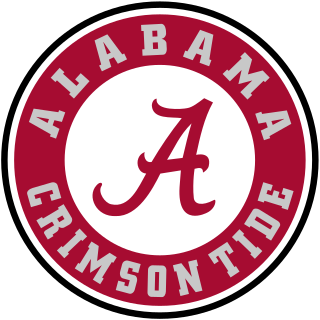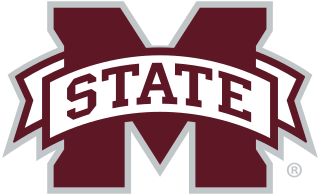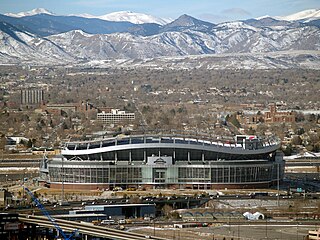Related Research Articles
Matthew Jones is an American former professional football player who was a wide receiver. He played college football for the Arkansas Razorbacks. Jones was selected by the Jacksonville Jaguars in the first round of the 2005 NFL draft, and also played for the Cincinnati Bengals. After his football career, he was a sports radio personality.
Paul Eells was an American sportscaster.

The 2006 Florida Gators football team represented the University of Florida in the sport of American football during the 2006 college football season. The Gators competed in the Football Bowl Subdivision (FBS) of the National Collegiate Athletic Association (NCAA) and the Eastern Division of the Southeastern Conference (SEC), and played their home games at Ben Hill Griffin Stadium on the university's Gainesville, Florida campus. The season was the second for head coach Urban Meyer, who led the Gators to an SEC Championship, a BCS National Championship, and an overall win–loss record of 13–1 (.929). Their one loss coming from an upset by the Auburn Tigers.

The 2007 Tennessee Volunteers football team represented the University of Tennessee in the 2007 NCAA Division I FBS football season. They won the Eastern Division of the Southeastern Conference before falling to the eventual national champion LSU Tigers in the SEC Championship Game. The Vols capped off the season by defeating the Wisconsin Badgers in the Outback Bowl to finish with a record of 10–4.

The 2008 Florida Gators football team represented the University of Florida in the sport of American football during the 2008 NCAA Division I FBS football season. The Gators competed in the Football Bowl Subdivision (FBS) of the National Collegiate Athletic Association (NCAA) and the Eastern Division of the Southeastern Conference (SEC), and played their home games in Ben Hill Griffin Stadium on the university's Gainesville, Florida, campus. They were led by fourth-year head coach Urban Meyer.

The 2006 Arkansas Razorbacks football team completed the season with a 10–4 record. The Razorbacks had a regular season SEC record of 7–1.

The 2008 Arkansas Razorbacks football team represented the University of Arkansas in the 2008 football season. The Razorbacks played five home games at Donald W. Reynolds Razorback Stadium in Fayetteville, Arkansas and one home game at War Memorial Stadium in Little Rock, Arkansas.[a] The Razorbacks finished the season with an overall record of 5–7 and a conference record of 2–6 in Bobby Petrino's inaugural season.

The 2003 Alabama Crimson Tide football team represented the University of Alabama in the 2003 NCAA Division I-A football season. It was the Crimson Tide's 69th as a member of the Southeastern Conference (SEC) and its 12th within the SEC Western Division. The team was led by head coach Mike Shula, in his first year, and played their home games at Legion Field in Birmingham and Bryant–Denny Stadium in Tuscaloosa, Alabama. They finished the season with a record of four wins and nine losses.

The 2002 Arkansas Razorbacks football team represented the University of Arkansas in the 2002 NCAA Division I-A football season. The Razorbacks played five home games at Donald W. Reynolds Razorback Stadium in Fayetteville, Arkansas and three home games at War Memorial Stadium in Little Rock, Arkansas. The Razorbacks reached the 2002 SEC Championship Game and the 2002 Music City Bowl in Houston Nutt's fifth season as head coach.

The Arkansas–Ole Miss football rivalry is an American college football rivalry between the Arkansas Razorbacks football team of the University of Arkansas and the Ole Miss Rebels football team of the University of Mississippi. The teams first met in 1908, and have played each other every year since 1981. Arkansas leads the series, which includes two wins by Ole Miss in postseason bowl games, the 1963 and 1970 Sugar Bowls.
The 2001 Arkansas Razorbacks football team represented the University of Arkansas in the 2001 NCAA Division I-A football season. The Razorbacks played five home games at Donald W. Reynolds Razorback Stadium in Fayetteville, Arkansas and two home games at War Memorial Stadium in Little Rock, Arkansas. The Razorbacks reached the 2002 Cotton Bowl Classic in Houston Nutt's fourth season as head coach.

The 2009 Arkansas Razorbacks football team represented the University of Arkansas in the 2009 NCAA Division I FBS football season. The Razorbacks played five home games at Donald W. Reynolds Razorback Stadium in Fayetteville, Arkansas and two home games at War Memorial Stadium in Little Rock, Arkansas. Head coach Bobby Petrino was in his second season at Arkansas. The Razorbacks finished the season 8–5, 3–5 in SEC play and won the Liberty Bowl 20–17 against East Carolina.

The 2010 Arkansas Razorbacks football team represented the University of Arkansas in the 2010 NCAA Division I FBS football season. The team played five home games at Razorback Stadium and two home games at War Memorial Stadium. Coach Bobby Petrino was in his third year with the Razorbacks. They were members of the Western Division of the Southeastern Conference. The Razorbacks finished the season 10–2, 6–2 in SEC play and earned a berth in the Sugar Bowl, their first major bowl appearance since playing in the 1990 Cotton Bowl Classic, where they were defeated by Ohio State by a 31–26 score.
The 2011 Kansas State Wildcats football team represented Kansas State University in the 2011 NCAA Division I FBS football season. The Wildcats played their home games at Bill Snyder Family Football Stadium, in Manhattan, Kansas as they have done since 1968. It was the 116th season in school history. The Wildcats were led by head coach Bill Snyder in his 20th overall and third straight season since taking over his second tenure in 2009. They are a member of the Big 12 Conference. After winning all three non-conference games, the conference schedule began with a close victory at home over the Baylor Bears, and ended with a victory over the rival Iowa State Cyclones in the Farmageddon showdown. Kansas State made to a 7–0 start for first time since 1999. In the week 10 action, Kansas State earned a quadruple-overtime win over the Texas A&M Aggies. It was the first overtime game in school history since the 1998 Big 12 Championship Game, a game that also saw the Wildcats and Aggies play, which they lost 36–33 in double-overtime.

The 2003 Arkansas Razorbacks football team represented the University of Arkansas during the 2003 NCAA Division I-A football season. The Razorbacks played five home games at Donald W. Reynolds Razorback Stadium in Fayetteville, Arkansas and two home games at War Memorial Stadium in Little Rock, Arkansas.

The 2013 Mississippi State Bulldogs football team represented Mississippi State University in the 2013 NCAA Division I FBS football season. The team was coached by Dan Mullen, who was in fifth season with Mississippi State in the 2013 season. The Bulldogs played their home games at Davis Wade Stadium in Starkville, Mississippi, and competed in the Western Division of the Southeastern Conference (SEC).

The Mile High Miracle refers both to the NFL 2012 AFC Divisional playoff game between the Baltimore Ravens and Denver Broncos on January 12, 2013, and its defining play, a game-tying 70-yard touchdown pass from Baltimore quarterback Joe Flacco to receiver Jacoby Jones with under a minute left in regulation. Playing on the road against the heavily favored Broncos, who had decisively defeated the struggling Ravens late in the regular season while on an 11-game winning streak, Flacco and the Ravens forced the Peyton Manning-led Broncos into double overtime, when rookie kicker Justin Tucker kicked a 47-yard field goal to secure a 38–35 win. With 28 points scored in the first eleven minutes of the game, three return touchdowns, five lead changes, and single-digit temperatures, the game was described by Sports Illustrated as "one of the most exciting and entertaining postseason games in NFL history." The Ravens would go on to beat the New England Patriots, and two weeks later, defeat the San Francisco 49ers in Super Bowl XLVII for the franchise's second championship.

The 2014 Kentucky Wildcats football team represented the University of Kentucky in the 2014 NCAA Division I FBS football season. The Wildcats competed as a member of the Southeastern Conference (SEC) as part of its Eastern Division. The team was led by head coach Mark Stoops, in his second year, and played its home games at Commonwealth Stadium in Lexington, Kentucky. The team started 5–1, but lost their final six games and finished the season 5–7, 2–6 in SEC play, and sixth place in the Eastern Division.
The 2016 TaxSlayer Gator Bowl was a post-season American college football bowl game played on December 31, 2016, at EverBank Field in Jacksonville, Florida. The 72nd edition of the Gator Bowl featured the Georgia Tech Yellow Jackets of the Atlantic Coast Conference against the Kentucky Wildcats of the Southeastern Conference. It began at 11 a.m. EST and aired on ESPN. It was one of the 2016–17 bowl games concluding the 2016 FBS football season. The game's naming rights sponsor was tax preparation software company TaxSlayer.com, and for sponsorship reasons was officially known as the TaxSlayer Bowl.

The 2022 Liberty Bowl was a college football bowl game played on December 28, 2022, at Simmons Bank Liberty Stadium in Memphis, Tennessee, United States. The 64th annual Liberty Bowl, the game featured the Kansas Jayhawks from the Big 12 Conference and the Arkansas Razorbacks from the Southeastern Conference (SEC). The game began at 4:35 p.m. CST and was aired on ESPN. It was one of the 2022–23 bowl games concluding the 2022 FBS football season.
References
- 1 2 3 4 5 6 7 8 9 10 11 12 13 "Arkansas Goes Seven Overtimes To Beat Kentucky 71-63." 11/01/2003.Game Summary at hogwired.com Retrieved on March 8, 2008.
- 1 2 3 Holt, Bob. "OT, oh yes." October 1, 2006. NWA News.com [ permanent dead link ] Arkansas Democrat-Gazette. Retrieved on March 4, 2008.
- 1 2 3 4 5 6 7 8 9 10 11 12 13 14 15 16 17 18 "Arkansas 71, Kentucky 69." Play by Play. Retrieved on March 8, 2008.
- 1 2 3 4 5 6 7 8 9 10 11 12 13 14 15 16 17 18 19 20 21 22 "Arkansas 71, Kentucky 63." Game is the longest in NCAA history. Retrieved on March 8, 2008.
- ↑ "'Hefty Lefty' Lorenzen shaping up for Big Blue ." Hefty Lefty. Retrieved on March 4, 2008.
- "Arkansas posts another 'unbelievable' seven-overtime win." November 2, 2003. Story at ESPN.com. Retrieved on March 8, 2008.